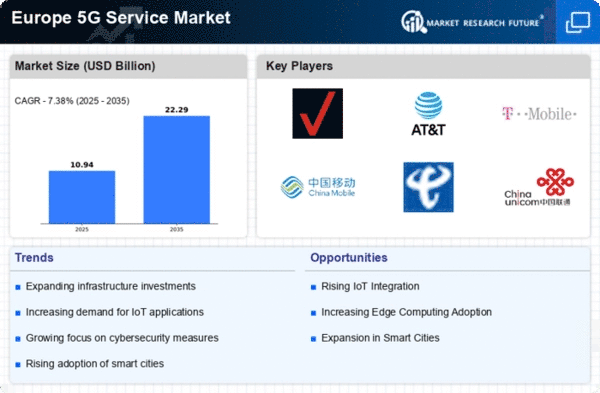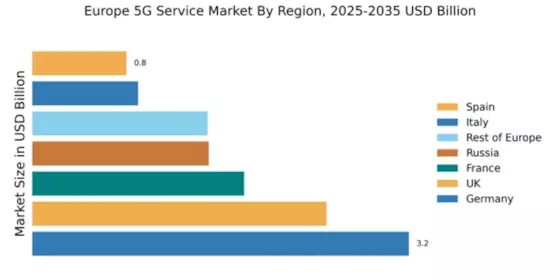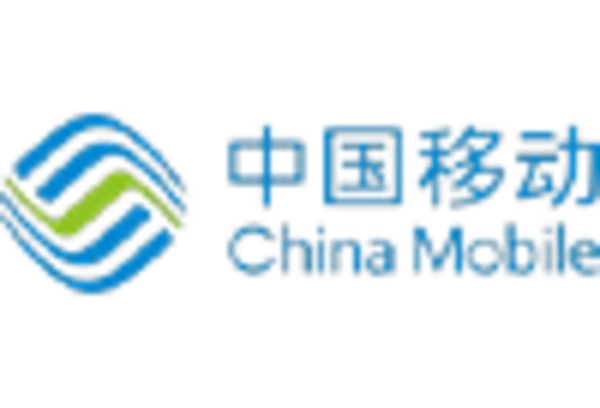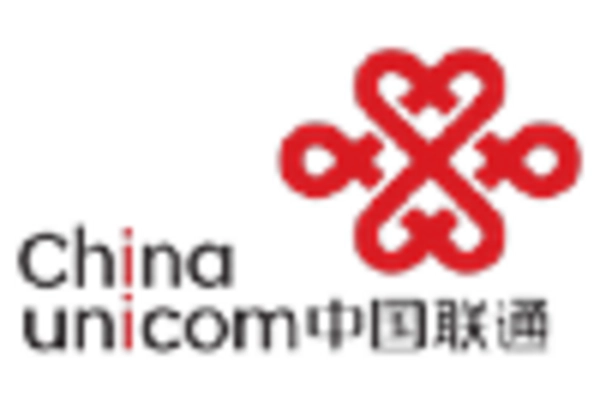Increased Mobile Data Consumption
The surge in mobile data consumption is a significant driver of the 5g service market in Europe. With the proliferation of streaming services, online gaming, and social media, users are consuming more data than ever before. Reports indicate that mobile data traffic in Europe is expected to grow by over 50% annually, necessitating the deployment of advanced 5g networks to accommodate this demand. The 5g service market is well-positioned to address these challenges, as it offers higher bandwidth and faster download speeds compared to previous generations. This increase in data consumption is not only driven by individual users but also by businesses that rely on mobile connectivity for operations. As a result, telecommunications companies are likely to invest heavily in 5g infrastructure to ensure they can meet the growing needs of consumers and enterprises alike.
Government Initiatives and Funding
Government initiatives and funding play a crucial role in shaping the 5g service market in Europe. Various European governments are actively promoting the deployment of 5g networks through financial incentives and policy frameworks. For instance, the European Commission has allocated €20 billion to support digital infrastructure projects, including 5g rollout. This funding is aimed at enhancing connectivity across the continent, particularly in underserved areas. The 5g service market stands to gain from these initiatives, as they facilitate collaboration between public and private sectors to accelerate network deployment. Additionally, regulatory frameworks are being established to streamline the approval processes for 5g infrastructure projects, which could potentially reduce time-to-market for service providers. Such government support is likely to foster a conducive environment for the growth of the 5g service market.
Competitive Landscape and Market Dynamics
The competitive landscape and market dynamics within the telecommunications sector are pivotal in shaping the 5g service market in Europe. As multiple players vie for market share, there is a notable push towards innovation and service differentiation. Major telecommunications companies are investing heavily in 5g technology to gain a competitive edge, which is likely to lead to enhanced service offerings and pricing strategies. The 5g service market is witnessing a trend where companies are forming strategic partnerships to leverage each other's strengths, thereby accelerating the deployment of 5g networks. Additionally, the entry of new market entrants is intensifying competition, prompting established players to enhance their service quality and customer experience. This dynamic environment is expected to drive further investment in 5g infrastructure, ultimately benefiting consumers and businesses across Europe.
Rising Demand for High-Speed Connectivity
The increasing demand for high-speed connectivity is a primary driver of the 5g service market in Europe. As businesses and consumers alike seek faster internet speeds, the need for robust 5g infrastructure becomes evident. According to recent data, approximately 70% of European households express a desire for improved internet services, which 5g technology can provide. This demand is not limited to urban areas; rural regions are also seeking enhanced connectivity to bridge the digital divide. The 5g service market is poised to benefit from this trend, as telecommunications companies invest in expanding their networks to meet consumer expectations. Furthermore, the proliferation of smart devices and IoT applications is likely to amplify this demand, creating a symbiotic relationship between technology adoption and the growth of the 5g service market.
Advancements in IoT and Smart Technologies
The rapid advancements in Internet of Things (IoT) and smart technologies are significantly influencing the 5g service market in Europe. As industries increasingly adopt IoT solutions, the need for high-speed, low-latency connectivity becomes critical. The 5g service market is expected to see substantial growth, with projections indicating that the number of connected IoT devices in Europe could reach 1 billion by 2026. This surge in connected devices necessitates a robust 5g infrastructure to support real-time data transmission and processing. Moreover, sectors such as healthcare, manufacturing, and transportation are leveraging 5g capabilities to enhance operational efficiency and improve service delivery. The integration of smart technologies with 5g networks is likely to create new business models and revenue streams, further driving the expansion of the 5g service market.

















